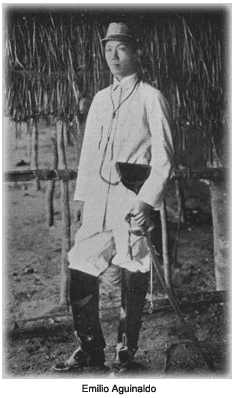An insurrection smoldered in the Philippines prior to the Spanish-American War. The insurgents` leader, José Rizal, was captured and executed by Spanish authorities. His successor, Emilio Aguinaldo, then in exile, was helped to return by Commodore George Dewey following the latter`s triumph at Manila Bay.
In August 1898, many Filipinos rejoiced at the collapse of Spanish power and assumed that independence would soon follow. Despite Filipino aspirations, Dewey advised Washington that the native republican element was a minority and a strong hand was needed to prevent the islands from falling into other hands.
 Dewey’s caution was not without foundation. Germany had been in contact with Spain in hopes of purchasing the islands. Tensions rose to such a height that the German Far Eastern fleet threatened Dewey’s smaller navy prior to the events at Manila Bay. Only the timely appearance of British ships enabled the Americans to continue their conquest.*
In late 1898, with the fighting stopped and peace negotiations underway, President McKinley faced the dilemma of deciding what to do with the Philippines. Imperialist and anti-imperialist forces at home voiced their opinions.
The president hesitated and turned to prayer. He concluded that the United States should accept control of the Philippines to educate and Christianize the natives — overlooking the fact that the overwhelming majority of the islands’ population was Roman Catholic.
Filipino republican leaders were incensed with the prospect of a continuing American presence in their homeland. Fighting broke out in February 1899, following the shooting of three Filipinos by U.S. soldiers in suburban Manila.
The insurrection raged for more than two years, exacting a far higher toll than the Spanish-American War. More than 120,000 American soldiers served in the conflict; at least 4,200 were killed. More than 16,000 Filipino fighters died.
Atrocities were common and committed by both sides. Further, a terrible toll was taken among the civilian populace with an estimated 200,000 succumbing to famine and disease.
The Filipino forces were no match for the Americans in open combat, but more than held their own in guerilla warfare. The insurgent forces split their command among a number of regional theaters, forcing the Americans to conduct extremely difficult operations in a variety of jungle locations.
In March 1901, Aguinaldo was captured. He realized that the insurgent cause was ultimately hopeless and called for an end to resistance. Nevertheless, sporadic fighting continued in the outlying areas until early 1902.
Dewey’s caution was not without foundation. Germany had been in contact with Spain in hopes of purchasing the islands. Tensions rose to such a height that the German Far Eastern fleet threatened Dewey’s smaller navy prior to the events at Manila Bay. Only the timely appearance of British ships enabled the Americans to continue their conquest.*
In late 1898, with the fighting stopped and peace negotiations underway, President McKinley faced the dilemma of deciding what to do with the Philippines. Imperialist and anti-imperialist forces at home voiced their opinions.
The president hesitated and turned to prayer. He concluded that the United States should accept control of the Philippines to educate and Christianize the natives — overlooking the fact that the overwhelming majority of the islands’ population was Roman Catholic.
Filipino republican leaders were incensed with the prospect of a continuing American presence in their homeland. Fighting broke out in February 1899, following the shooting of three Filipinos by U.S. soldiers in suburban Manila.
The insurrection raged for more than two years, exacting a far higher toll than the Spanish-American War. More than 120,000 American soldiers served in the conflict; at least 4,200 were killed. More than 16,000 Filipino fighters died.
Atrocities were common and committed by both sides. Further, a terrible toll was taken among the civilian populace with an estimated 200,000 succumbing to famine and disease.
The Filipino forces were no match for the Americans in open combat, but more than held their own in guerilla warfare. The insurgent forces split their command among a number of regional theaters, forcing the Americans to conduct extremely difficult operations in a variety of jungle locations.
In March 1901, Aguinaldo was captured. He realized that the insurgent cause was ultimately hopeless and called for an end to resistance. Nevertheless, sporadic fighting continued in the outlying areas until early 1902.